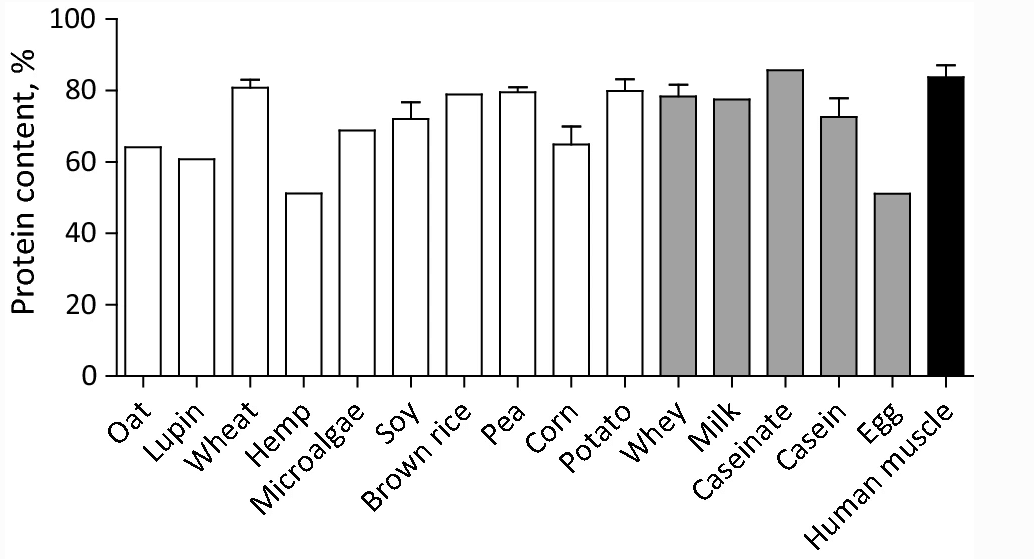Hemp and pea protein are the 2 most popular plant-based protein powders.
The only other one that comes close to popularity is brown rice protein.
If you’ve ever wondered whether hemp or pea protein was better for you, this data-backed comparison of the protein quality, nutrition, and price of each will help you decide.
Table of Contents
Research on Effectiveness of Pea and Hemp Protein
At the moment, there’s some research on pea protein powder, but very little practical research on hemp protein.
One study found that pea protein powder was just as effective as whey protein for building muscle in a 12 week study, and other studies have found similar results.
There are no similar studies on hemp protein powder that I’ve been able to find.
Plant-based protein can rival typical dairy-based proteins in terms of effectiveness, but right now pea protein is the only one with significant research behind it.
Hemp vs Pea Protein Macros
While all protein powder isolates are relatively high in protein, some protein can be extracted from other nutrients more effectively than others.
In general, you want as much protein as possible in your shakes, with limited fat and carbohydrates.
While macros vary among brands, research shows that hemp protein powder has a lower percent of protein than pea protein, as shown in the graph below (source):
On the other hand, the protein content of pea is right up there with the best sources, including non-plant sources.
We can also look at commercial products. To be fair, let’s look at the nutrition data for NOW Sports hemp and pea protein powder. Both have only one ingredient in them.
| Hemp Protein Powder | Pea Protein Powder | |
|---|---|---|
| Serving Size | 30 g | 30g |
| Calories | 120 | 120 |
| Fat (g) | 3.5 | 2.5 |
| Carbohydrates (g) | 7 | 1.5 |
| Fiber (g) | 5 | 1.5 |
| Protein (g) | 15 | 23 |
| Calcium (%RDA) | 4% | 6% |
| Iron (%RDA) | 50% | 45% |
| Potassium (%RDA) | 8% | 0% |
Hemp is higher in fat and carbohydrates (mostly fiber though) than pea protein powder for the same number of total calories.
A standard scoop of pea protein powder has about 50% more protein than hemp, making it the better choice in most cases.
Hemp and Pea Protein Amino Acid Comparison
We can also look at the essential amino acid profiles in each of these protein powders.
The table below shows the percentage of each amino acid group in a sample of pure protein of each powder. I’ve also included a column that’s based on the complete protein specifications from the WHO.
| Complete Protein (min %) | Pea protein (%) | Hemp Protein (%) | |
|---|---|---|---|
| Histidine | 1.8 | 2.5 | 2.7 |
| Isoleucine | 2.5 | 4.8 | 4.5 |
| Leucine | 5.5 | 8.5 | 6.8 |
| Lysine | 5.1 | 7.5 | 3.8 |
| Methionine+Cysteine | 2.5 | 1.9 | 4.6 |
| Phenylalanine+Tyrosine | 4.7 | 5.5 | 8 |
| Threonine | 2.7 | 3.7 | 3.9 |
| Tryptophan | 0.7 | 1 | 1.17 |
| Valine | 3.2 | 5 | 5.6 |
There are 2 things to note here:
- Completeness – Pea protein is low in methionine (plus cysteine), but has more than enough of all other essential amino acids. Hemp protein is low in lysine, but is fine in the rest.
- BCAAs – The three branched chain amino acids are leucine, isoleucine, and valine. They are needed for muscle synthesis. A total of 18.3% of pea protein is composed of BCAAs, while 16.9% of hemp protein’s profile is.
If someone is worried about having a complete protein source, they are better off finding a protein powder with a blend of both, since they complement each other’s weakness well.
In terms of muscle building, pea protein is likely preferable over hemp protein due to having a higher amount of BCAAs. Realistically, only high level athletes and bodybuilders will potentially see a significant difference from this.
Cost of Hemp vs Pea Protein Powder
Pea protein is the most popular plant-based protein powder, and typically it is cheaper, especially if you buy in bulk. It’s hard to find hemp protein powder in bulk.
The difference isn’t that big in many cases.
For example, looking at NOW Sports hemp and pea protein powders, which are relatively cheap compared to other commercial products, the prices at the time of writing are:
- Hemp protein powder – $0.038 per gram
- Pea protein powder – $0.035 per gram
There are some brands of hemp protein powder that are extremely expensive, but if budget is your main concern, you can find either type for a comparable amount.
Which is Better: Hemp or Pea Protein Powder?
One final aspect to consider is taste, which is subjective. I’ve tried over 50 plant-based protein powders at this point, and in my opinion, pea protein powder tastes significantly better than hemp.
But in terms of everything else we looked at, here’s a quick summary:
- Macros – Per calorie, pea protein has about 50% more protein than hemp.
- Amino acids – Both are low in a particular essential amino acid, but pea protein has more BCAAs, which is better for building muscle.
- Price – Pea protein is typically a bit cheaper, but not by a huge amount.
Both are protein isolates, which means they are almost all protein and contain very little other nutrients. In other words, there’s no big benefits besides what the protein brings.
And based on those main categories, pea protein is better for most people, although a blend of both (mainly pea protein with a bit of hemp) would actually be best.

